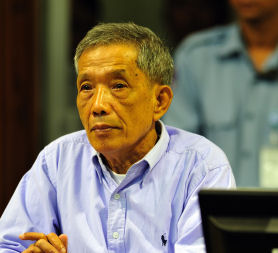Anger as Khmer Rouge leader jailed for 35 years
A former chief of Cambodia’s notorious S-21 prison camp has been jailed for thirty five years in Cambodia. Photographer Nic Dunlop tells Channel 4 News about his involvement in the conviction.

Kaing Guev Eav, who was also known as Duch, had been the first of five former Khmer Rouge commanders to face the United Nations backed tribunal.The 67-year-old had been accused of overseeing the deaths of 14,000 people during the group’s agrarian revolution, in which 1.7 million people were killed between 1975 and 1979.
The charges related to Duch’s role as the prison chief of S-21, a converted school were many prisoners were tortured and forced to confess to their crimes before being bludgeoned to death in the “killing fields” execution sites.Duch was sentenced to 35 years in prison, after the joint UN-Cambodian court opted against a life sentence, citing his remorse, cooperation with the tribunal and time served. He is expected to serve about half that sentence.
“The chamber has decided there are significant mitigating factors that mandate a finite term imprisonment rather than a life imprisonment”, the tribunal’s president said. Duch had argued that he had merely been following orders, although prosecutors had argued that he failed to prevent torture at the prison.Relatives of his victims expressed outrage at the length of his sentence, which was broadcast live across Cambodia.
“If you can kill 14,000 people and serve only 19 years – 11 hours per life taken – what is that? It’s a joke,” said Theary Seng. Her father had died at S-21.”There is no justice. I wanted life imprisonment for Duch,” said Hong Sovath, who lost her father in the prison.The tribunal has still to hear the cases of four other former other Khmer Rouge leaders.
Former President Khieu Samphan, “Brother Number Two” Nuon Chea, former foreign minister Ieng Sary and his wife Ieng Thirirth are still awaiting trial. Critics have attacked the tribunal’s drawn-out legal processes and point out many former Khmer Rouge members are now members of Cambodia’s civil service who are keen to limit the scope of its investigations.
"He began this extraordinary confession"
Nic Dunlop is a photographer and author of The Lost Executioner. He told Channel 4 News how he identified Comrade Duch in 1999, and later returned to confront him about his past.
"I returned with another journalist and it was during the course of the conversation that I think three times we put it to him that we understand you were head of S-21 during the Khmer Rouge period, that you ran this prison.
"Three times he deflected – but it wasn’t until later he looked at the business card of my colleague that he realised why we had come, that he had been identified.
"He began this extraordinary confession where he expressed what appeared to be genuine remorse for the killings that he'd began to establish a change of command.
He said things like: 'there were many people innocent, I feel very bad about the killings and the past, I believe that was the way to conduct a revolution'.
I don't know why he talked the way he did."
-
Latest news
-
Are TikTok political campaigns winning over the youth?3m

-
‘Surviving Evin’ exhibition depicts life in Iran’s notorious prison4m

-
SNP relaunches election campaign vowing to “put Scotland’s interests first”3m

-
‘A better skill system will help bring net migration down’ says Shadow Education Secretary5m

-
Labour pledges to cut net migration as Tories announce GP plan3m

-




